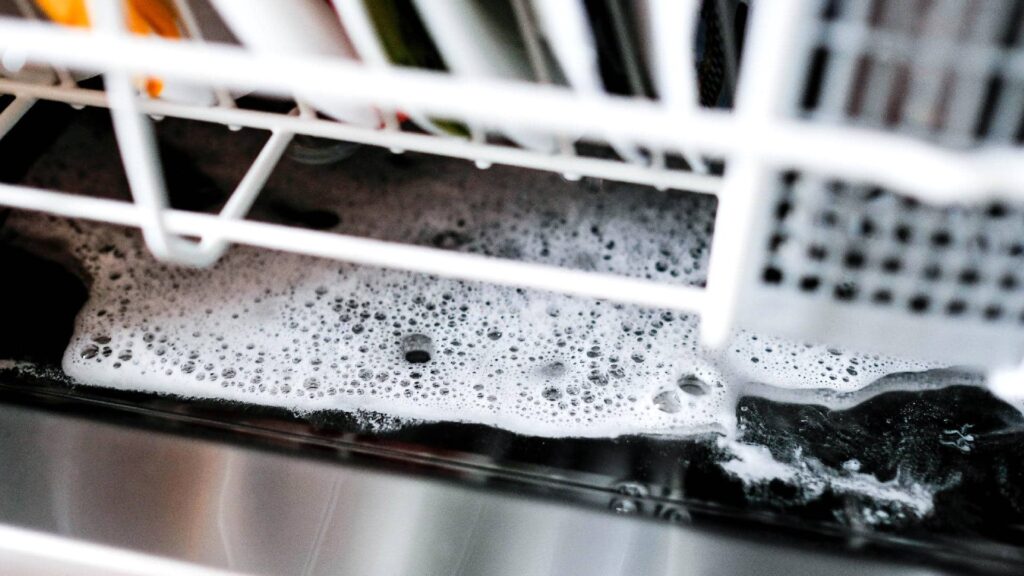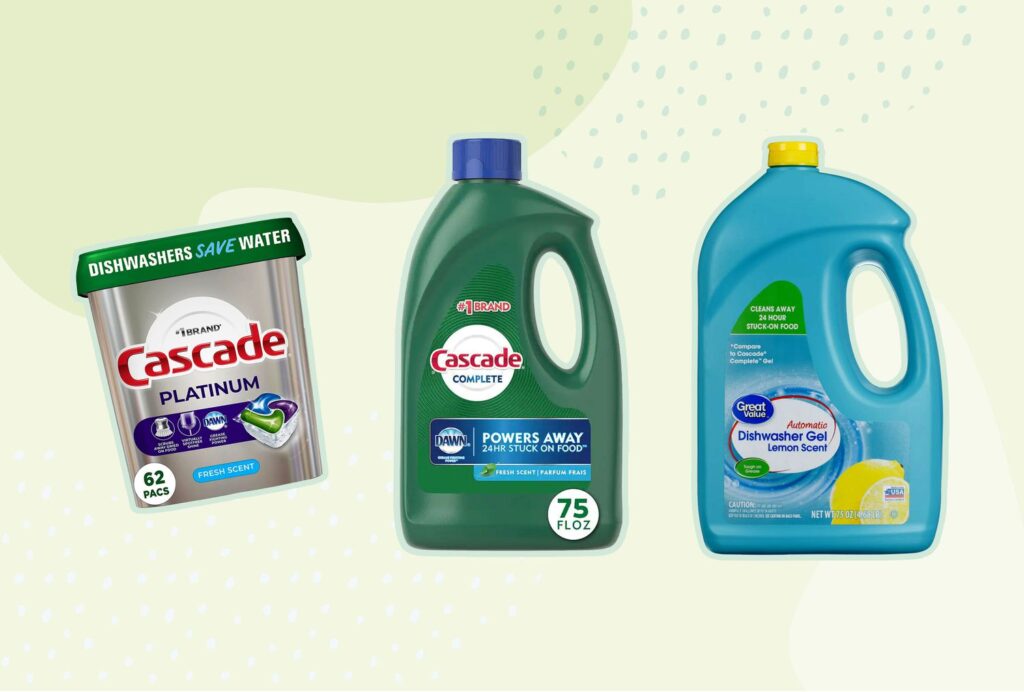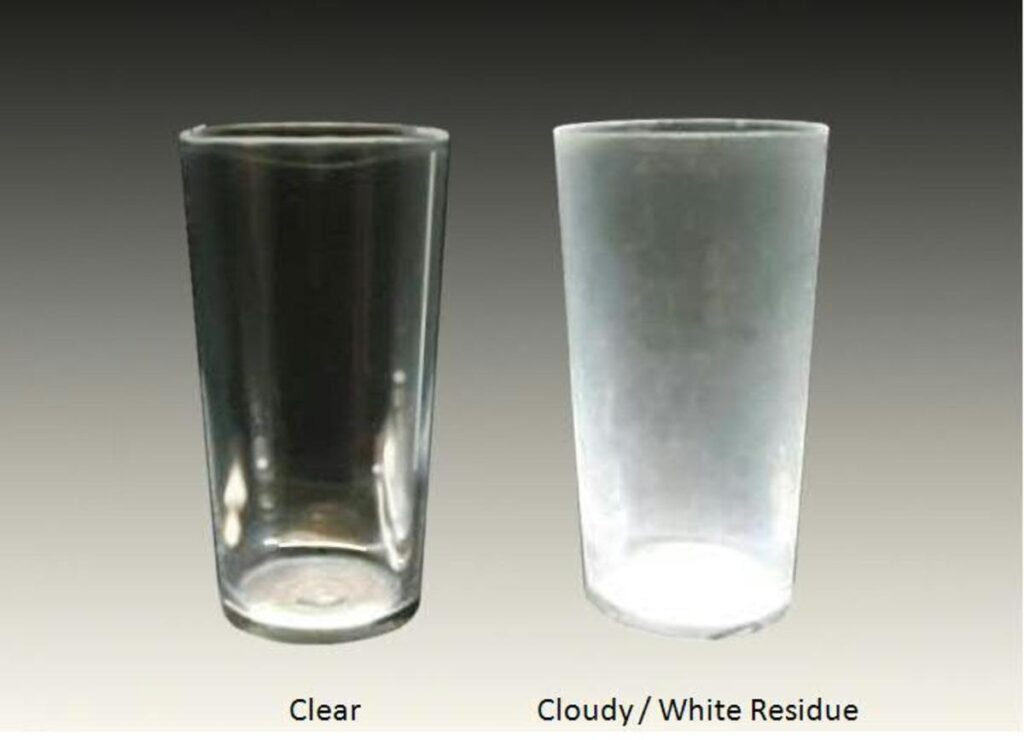
If you’ve ever opened your dishwasher after it’s done running, only to find a frustrating film of detergent residue on your dishes, glassware, and even the interior of the appliance itself, you’re not alone. Dealing with dishwasher detergent residue can be a frustrating problem, especially when you’re relying on your dishwasher to efficiently clean your dishes. Luckily, there are effective solutions available that can help you troubleshoot and get rid of this pesky residue, ensuring sparkling clean dishes every time.

This image is property of www.funktionalhome.com.
Understanding Dishwasher Detergent Residue
What is dishwasher detergent residue?
Dishwasher detergent residue refers to the film or buildup left behind on your dishes after running them through the dishwasher. It can manifest as a cloudy or filmy appearance on glassware or dishes, or as a white or chalky residue. This residue is often caused by a variety of factors and can be frustrating to deal with, as it can negatively affect the cleanliness and appearance of your dishes.
Causes of dishwasher detergent residue
There are several common causes of dishwasher detergent residue. One potential cause is the use of too much detergent, which can result in excessive suds that fail to fully rinse away from your dishes. Another common cause is water temperature issues, particularly if the water used in your dishwasher is not hot enough to effectively dissolve the detergent. Additionally, improper loading techniques and overcrowding of the dishwasher can lead to inadequate water flow and prevent the detergent from being distributed evenly. Lastly, the type and formulation of the detergent used can also play a role in the occurrence of residue. Some detergents may be more prone to leaving behind a film or residue compared to others.
Selecting the Right Dishwasher Detergent
Choosing a detergent suitable for your dishwasher
When it comes to selecting a dishwasher detergent, it is crucial to consider the compatibility with your specific dishwasher model. Some dishwashers are designed to work best with certain types of detergents, so it is important to check your manufacturer’s recommendations. Additionally, consider any specific cleaning needs you may have. If you frequently have heavily soiled dishes or cookware, you may want to opt for a detergent with extra cleaning power.
Considering detergent types and formulations
There are various types and formulations of dishwasher detergents available on the market. Traditional powdered detergents, liquid detergents, and detergent pods are all options to consider. Each type has its own advantages and disadvantages. Powdered detergents are often more effective at tackling tough stains but may leave more residue behind. Liquid detergents are convenient and dissolve easily, but may not be as effective on heavily soiled dishes. Detergent pods provide a pre-measured amount of detergent, ensuring you use the correct amount, but may be more expensive. Ultimately, the best detergent for you will depend on your specific needs and preferences.

This image is property of paradiseapplianceservice.com.
Proper Loading Techniques
Arranging dishes to prevent detergent residue
Properly loading your dishwasher can significantly reduce the occurrence of detergent residue. When loading your dishwasher, ensure that dishes and utensils are positioned in a way that allows water and detergent to reach all surfaces. Avoid nesting dishes together or stacking them too closely, as this can create areas where the water and detergent cannot effectively reach. By spacing out your dishes and arranging them in a way that promotes optimal water flow, you can help prevent the formation of residue.
Avoiding overcrowding in the dishwasher
Overcrowding the dishwasher is a common mistake that can contribute to the presence of detergent residue. When you overload the dishwasher, dishes may not have adequate space for water and detergent to circulate, resulting in poorly cleaned dishes and a higher likelihood of residue. It is important to give each item enough space to ensure proper cleaning and rinsing. Consider running larger loads of dishes in multiple cycles or hand-washing some items if your dishwasher is consistently overloaded.
Loading the Detergent Correctly
Using the recommended amount of detergent
Using the correct amount of detergent is essential to minimize residue. It is important to follow the manufacturer’s guidelines and use the recommended amount for your specific dishwasher and detergent. Using too little detergent may result in poorly cleaned dishes, while using too much can lead to excessive suds and residue buildup. By carefully measuring and dispensing the correct amount of detergent, you can optimize cleaning performance and reduce the chances of residue being left behind.
Avoiding pre-washing dishes
Contrary to popular belief, pre-washing dishes before loading them into the dishwasher is generally unnecessary and can even contribute to detergent residue. Most modern dishwashers are designed to effectively remove food residue without the need for pre-washing. By scraping off excess food particles and avoiding pre-washing, you allow the dishwasher detergent to work as intended. Pre-washing can create a film on dishes and utensils that interacts with the detergent, leading to a higher likelihood of residue. Save time and water by skipping the pre-washing step and allowing your dishwasher detergent to do its job.

This image is property of cdn2.momjunction.com.
Addressing Water Temperature Issues
Adjusting water heater temperature settings
Water temperature plays a crucial role in the effectiveness of dishwasher detergent. If the water entering your dishwasher is not hot enough, it may not fully dissolve the detergent, leading to residue. To address this issue, check the temperature setting on your water heater. Ideally, it should be set between 120°F (49°C) and 125°F (52°C) to ensure optimal cleaning performance. Adjusting the water heater temperature within this range can help eliminate water temperature as a potential cause of detergent residue.
Ensuring hot water supply to the dishwasher
In addition to adjusting the water heater temperature, it is important to ensure that hot water is being supplied to your dishwasher. Before starting a dishwasher cycle, run the hot water tap in your sink until the water becomes hot. This ensures that the dishwasher is starting with hot water instead of cold or lukewarm water. Hot water aids in dissolving the detergent properly and ensures that it can effectively remove food particles and residue from your dishes. By confirming a hot water supply to the dishwasher, you can increase the chances of achieving sparkling clean dishes without any residual film.
Regular Maintenance and Cleaning
Removing and cleaning dishwasher filters
Regular maintenance of your dishwasher is essential for preventing detergent residue. Many dishwashers have filters that should be regularly removed and cleaned to ensure proper water flow and filtration. Over time, these filters can become clogged with food particles and debris, hindering the dishwasher’s ability to effectively clean your dishes. By removing and cleaning the filters according to your dishwasher’s instructions, you can prevent unwanted residue from forming and maintain optimal dishwasher performance.
Cleaning the dishwasher interior and spray arms
In addition to cleaning the filters, it is important to regularly clean the interior of your dishwasher and the spray arms. Over time, mineral deposits, remnants of detergent, and food particles can accumulate on the surfaces inside the dishwasher, resulting in residue on your dishes. To clean the interior, wipe down the walls, racks, and door with a damp cloth or sponge. You can also use a dishwasher-safe cleaning solution or a mixture of vinegar and water for a more thorough cleaning. Pay extra attention to the spray arms, ensuring that the spray nozzles are free from any blockages. By keeping your dishwasher clean and free from buildup, you can reduce the chances of detergent residue on your dishes.

This image is property of www.thespruce.com.
Ensuring Adequate Water Flow
Checking water inlet and spray arm openings
Another potential cause of detergent residue is blockages in the water inlet and spray arm openings of your dishwasher. Over time, these openings can become clogged with debris, preventing proper water flow and distribution. To address this issue, carefully inspect the water inlet and spray arm openings, removing any visible blockages. You can use a toothpick or small brush to dislodge any stubborn residue. By ensuring unobstructed water flow, you can maximize the effectiveness of your dishwasher detergent and minimize the chances of residue.
Addressing water pressure issues
Insufficient water pressure can contribute to the occurrence of detergent residue. If you notice a decrease in water pressure in your dishwasher, it may be necessary to address the underlying issue. Start by checking the water supply valve to ensure it is fully open. If the valve is open but the water pressure remains low, you may need to consult a professional plumber to assess and resolve the problem. Adequate water pressure is crucial for the proper functioning of your dishwasher and the successful removal of detergent residue.
Using Rinse Aid
Understanding the benefits of rinse aid
Rinse aid is a useful addition to the dishwasher routine, especially if you are struggling with detergent residue. Rinse aid helps to prevent spotting, streaking, and the formation of residue on your dishes. It works by reducing the surface tension of water, allowing it to flow more easily and effectively rinse away any remaining detergent or food particles. By using rinse aid, you can improve the overall clarity and cleanliness of your dishes, eliminating the need for additional rinsing or rewashing.
Choosing and using rinse aid correctly
When selecting a rinse aid, look for one that is specifically designed for use in dishwashers. Follow the manufacturer’s instructions regarding dosage and frequency of use. Most rinse aids have a dispenser built into the dishwasher, making it easy to add the appropriate amount. It is important to avoid overfilling the dispenser, as this can lead to excessive product being dispensed and potential residue. By using rinse aid correctly, you can enhance the performance of your dishwasher detergent and achieve spotless, residue-free dishes.

This image is property of images.saymedia-content.com.
Appropriate Dishwasher Cycle Selection
Matching the cycle to the load and detergent
Choosing the right dishwasher cycle is crucial for effective cleaning and to minimize detergent residue. Most dishwashers offer a range of cycle options, such as normal, heavy-duty, eco-friendly, or quick wash. Take into consideration the level of soiling on your dishes and the type of detergent being used when selecting a cycle. For heavily soiled dishes, a heavy-duty or intensive cycle may be more effective, while lighter loads may benefit from a quick wash cycle. By matching the cycle to the load and detergent, you can optimize the cleaning process and reduce the chances of residue.
Using high-temperature or sanitizing cycles
If you consistently experience detergent residue, using a high-temperature or sanitizing cycle can help eliminate the issue. These cycles use hotter water temperatures to ensure thorough cleaning and sanitization of your dishes. The high heat can aid in dissolving the detergent more effectively, leaving behind fewer residues. However, keep in mind that these cycles may have longer run times and consume more energy, so they may not be suitable for every load. Reserve high-temperature or sanitizing cycles for heavily soiled or germ-prone items to ensure the best results and minimize detergent residue.
Consulting the Manufacturer’s Guide
Referencing the dishwasher manual or online resources
When dealing with persistent dishwasher detergent residue, consulting the manufacturer’s guide is always recommended. The dishwasher manual or online resources provided by the manufacturer often contain valuable information and troubleshooting tips specific to your dishwasher model. These resources can provide insights into optimal loading techniques, cycle selection, and recommended detergent types. By following the manufacturer’s recommendations, you can address detergent residue issues effectively and maximize the performance of your dishwasher.
Contacting the manufacturer for specific advice
If you have exhausted all other troubleshooting methods and continue to struggle with detergent residue, it may be beneficial to reach out to the dishwasher manufacturer directly. The manufacturer’s customer service team can provide specific advice and guidance based on your unique situation and dishwasher model. They may be able to offer additional solutions or insights into potential underlying issues causing the residue problem. Don’t hesitate to contact the manufacturer for assistance, as they are often the experts in their product and can provide tailored recommendations to resolve detergent residue issues.
By following the tips and strategies outlined in this comprehensive guide, you can tackle detergent residue in your dishwasher and achieve spotless, residue-free dishes. Understanding the causes of residue, selecting the right detergent, utilizing proper loading techniques, adjusting water temperature, maintaining your dishwasher, ensuring adequate water flow, using rinse aid, selecting appropriate cycles, and consulting the manufacturer’s guide can all contribute to a cleaner, more efficient dishwasher. With a little knowledge and some simple adjustments, you can say goodbye to pesky detergent residue and enjoy sparkling clean dishes with every wash.




